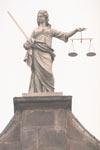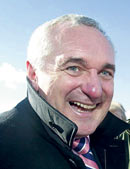Bertie's Tribunal in crisis

The Planning Tribunal is threatening further political embarrassment for Bertie Ahern. The tribunal is in crisis because of the disclosure that it misled the High Court earlier this year on, potentially, an explosive issue, and because it has emerged that for years the tribunal was acting illegally, abusing the constitutional rights of persons appearing before it.
The tribunal, now chaired by Judge Alan Mahon and formerly by Mr Justice Feargus Flood, has made two startling admissions recently, both of which could cause its collapse and the rescinding of all the findings already made by it.
The first is an acknowledgement that, contrary to assurances it gave the High Court earlier this year, audio recordings were indeed made of private interviews with witnesses.
The second was made in a document submitted to the Supreme Court earlier this year, where it acknowledged that it “failed to respect the principles of natural and constitutional justice and fair procedures and was in breach of Article 40.3 of the Constitution”.
 This concession by the tribunal about its previously unconstitutional conduct was made in the “Statement of Opposition” submitted by the tribunal in response to the judicial review application taken by Owen O'Callaghan. The Statement of Opposition is signed by one of the tribunal solicitors, on behalf of the tribunal, Susan Gilvarry.
This concession by the tribunal about its previously unconstitutional conduct was made in the “Statement of Opposition” submitted by the tribunal in response to the judicial review application taken by Owen O'Callaghan. The Statement of Opposition is signed by one of the tribunal solicitors, on behalf of the tribunal, Susan Gilvarry.
Paragraph 32 of that Statement of Opposition states:
“While it is admitted that the High Court and the Supreme Court determined that the refusal by the tribunal to disclose certain statements and documents to (Owen O'Callaghan) to facilitate the cross-examination of Mr Gilmartin failed to respect the principles of natural and constitutional justice and fair procedures and was in breach of Article 40.3 of the Constitution, the tribunal in so refusing and in resisting the application for judicial review, at all times acted in good faith and in accordance with its then belief as to acceptable legal principles”.
In the course of subsequent judicial review proceedings, the tribunal claimed that while it had acted unconstitutionally in refusing to disclose material, parties then at the tribunal were by then in a position to correct any unjustified damage to their reputations because the material in question had been disclosed.
But, clearly, this redress is not now available to persons against whom findings have been made by the tribunal in previous modules. They are not now in a position to have material disclosed to them that would assist in the cross-examination of their accusers. And the question arises, can the previous findings of the tribunal, which were based on a procedure that has now been found to have been constitutionally defective, any longer stand? In other words, does the revelation that the tribunal has been acting unconstitutionally since Day One, invalidate all or some of its proceedings to date?
 Lawyers are divided on the significance of this. Some believe that the courts would have to set aside the findings of the tribunal where there is evidence that a person was seriously disadvantaged by having material relevant to their case withheld from them.
Lawyers are divided on the significance of this. Some believe that the courts would have to set aside the findings of the tribunal where there is evidence that a person was seriously disadvantaged by having material relevant to their case withheld from them.
Others claim that the courts would not set aside the findings of the tribunal, even though it is clear that in many instances at least, the tribunal was acting illegally. They say that the Supreme Court is now likely to find that because a party did not challenge the procedure at the time, they would be disbarred from doing so now (even though they would not have appreciated the procedure to which they were subjected was unconstitutional). Since the Supreme Court decided to order the arrest and imprisonment of a person (Mr “A”) on conviction of a crime that they (the Supreme Court) had found not to exist (statutory rape), there is hardly any telling what the Court might do in this instance.
But on strict legal reasoning, it would seem that all the findings made against the following might be set at nought: Ray Burke, Brennan and McGowan, Tom and Michael Bailey, Oliver Barry the former promoter of Century Radio, Joseph Murphy Structural Engineers (JMSE) and others.
However there is another significance and this has to do with costs.
The tribunal refused to order the stateto cover the legal costs of several parties who appeared before the tribunal up to 2002 and who, according to the Tribunal, failed to co-operate with it.
Given that the tribunal's procedures failed to respect the constitutional rights of many of the persons appearing before it, including many of those against whom findings were made, it is difficult to see how such persons could be refused a reimbursement of their costs incurred in the context of this illegality on the part of the tribunal.
The effect of this would be to grossly inflate the costs of the tribunal to date.
Last February Michael McDowell, then Minister for Justice, Equality and Law Reform, said the total costs of the Mahon tribunal would be close to €1 billion. In response Chairman of the tribunal , Judge Alan Mahon, insisted the costs would be a third of that, around €300m.
But if the costs of all the parties to date have to be paid by the State, the costs would prove considerably higher, certainly higher than those estimated by the current chairman.
